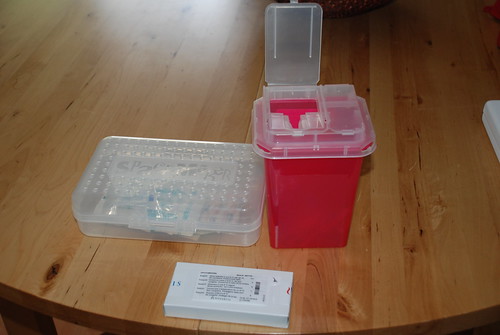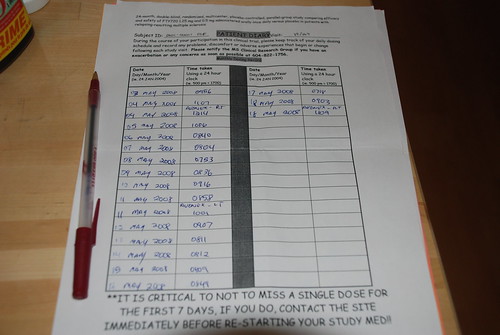In a couple weeks I'll be hearing back on the extension part of the trial. It's not fully ready so I'm officially off all of the meds. I took my last dose of Fingolimod after I did all my bloodwork and that was it. WEIRD! I was about to leave the house this morning and I couldn't figure out what I was missing. I just knew something in my routine wasen't right and it felt like I was leaving the house without something. I figured out it was the whole pill taking and writing down the time and date in my diary. And you know, it was a bit of a strange feeling that I talked to my nurse about - not wanting to be off MS meds now. Be it Avonex or Fingolimod (whatever I'm on) I'm thankful for the impact it's made so far on my health. I've only had one attack in the last year. I have to live with MS all my life so I know I have to be an active participent in managing it, so being off of everything just feels wrong now! So I'm looking forward to finding out more about the extension when it's ready.
The last one!
This is getting all my stuff out and letting the injection warm from being in the fridge:

Here's my kit with gauze, alcohol wipes and bandaides.

First I swipe my injection spot with the alcohol wipe so it drys before I stab myself. Then I start pulling out all the other things I'll need for once I've done the injection.

And now I've put the needle together getting ready to stab. Sorry no pics of that part. It was too hard to take! This one is blurry too... sorry! Like my nail colour today? ;)

Ta da! Very last injection done! WOOHOO! So then I throw my used needle in my little sharpie box:

And lastly, I head to my counter to write in my clinical trial diary the time, date and what thigh I stabbed so I won't do the same one two weeks in a row.

Done! I can't believe I actually survived one year of stabbing myself when I used to faint at every stab or blood test I've ever done in my past. I'm pretty proud of myself for changing that part of me and doing the right thing with putting myself on an MS drug.
Almost there! One year on Fingolimod (maybe)! :)
I have made the decision to go in the extention trial and as I understand it so far, I will just continue on the oral Fingolimod and will not continue Avonex injections. Interesting. So, my hope would be to stay on the pill until it reaches FDA approval so that I wouldn't have to take a break from it and have to do another MS med until it does become available. I'll be getting all the details on Tuesday at my one year appointment.
So Tuesday... what a day that will be. Here's the run down:
Urinalysis and pregnancy test
Bloodwork
Ophthalology exam with optical coherence tomography test
Neurolical exam
Physical exam
Vital Signs
ECG
MSFC
MRI
Pulmonary Function Test
Chest X-Ray
Quality of Life Questionaires
Review of any adverse events
Phew! That is going to be one long day. My eye exam starts at 8:30 and that means having hugely dialated eyes for most of the day! Argh! I hate those super duper drops they use. And the most disappointing thing is that I will not be told for probably a year as to what med I've been on all this year. Darn! I really wanna know!
Exercise DOES help MS!
"Exercise helps with primary symptoms such as fatigue, stiffness, numbness and pain. It also helps increase flexibility, enhance mood, improve bowel and bladder function and is also found to improve independent functioning.
“A person with MS, depending on the degree of mobility or impairment, can do the exercises that any able-bodied person can do,” said Dr. Garry Wheeler, vice president of the MS Society of Canada’s Alberta division. Though exercise is recommended, people with MS should consider several different factors when exercising, he said.
Because high temperatures can make symptoms of MS worse, he suggests exercising in a cool environment.
Wheeler also suggests exercising earlier in the day and doing so at an easy pace because fatigue is a factor among people with MS.
Balance and co-ordination is also a consideration for people with MS, Wheeler said.
“Running on a treadmill might be problematic for a person with balance problems so an exercise bike might be better.”
Because bladder control can be a problem “it’s important that a person empties their bladder before they exercise.”
People with MS should also drink a fair amount of water before they exercise to make sure they are well-hydrated.
Also be careful of the symptoms that any medications may cause such as dizziness.
“You don’t don’t want to be doing stressful exercise if you’re going to become dizzy and so on,” Wheeler said.
As MS progresses, memory and comprehension issues can affect the ability to follow instructions so its important to be in a safe environment and it’s a good idea to have a partner while exercising.
In case of a relapse, Wheeler said to slow down or take a break and he suggests consulting with a physician before beginning any exercise program."
A whole lot of puppy
Shelty and all her pups:

Little tiny dog pile:

Sydney, the waaaaayyyy too cute Golden Retriever:

And bringing me a dandylion:

Hope all you moms out there had a great Mothers Day on Sunday.
Get your oil changed at Mr. Lube on May 10!
"We are pleased to be partnering with the MS Society of Canada for the second year through our annual Founder's Day Campaign as we recognize the founder of Mr. Lube Canada, Mr. Clifford Giese and this important charity," says Paul Healey, President and CEO of Mr. Lube Canada. "We raised over $21,000 in 2007 and are excited about this year's campaign. Every oil change will donate $5.00 towards the MS Society of Canada on Saturday, May 10th."
Through Mr. Lube Canada and the Mr. Lube Foundation, the MS Society of Canada is one of many charities that are supported nationally. The Foundation's primary focus for support is Prostate Cancer Research and Education and Children's Welfare. Since 2002, Mr. Lube Canada and the Mr. Lube Foundation have donated over $3 million dollars to these and other local charities across the country."
Prozac May Help Curb Disease Activity In MS
"Detailed brain scans (magnetic resonance images or MRI) every four weeks were used to check for new areas of neurological inflammation, a hallmark of active disease. In total, 38 patients--19 in each group--completed the study. The scans showed that those in the placebo group had more new areas of inflammation than those treated with Prozac.
The effects began to become evident after eight weeks, which corresponds to the time the selective serotonin reuptake inhibitor (SSRI) class of drugs, of which Prozac is one, start to work on relieving depression.
The average number of new areas affected was more than five in the group given the placebo compared with just under two in the group given Prozac. One in four scans from patients treated with Prozac showed new areas of inflammation compared with four out of 10 of those taking placebo.
During the last 16 weeks of treatment, almost two thirds of patients (63%) in the group given Prozac had no new areas of inflammation compared with only one in four (26%) in the group given placebo.
The authors caution that their study was small, and larger studies would be needed before firm conclusions could be drawn."


